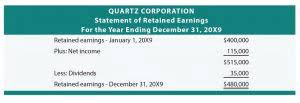
And some events are less obvious like an uninsured business loss from flood damage, losing a lawsuit, etc. These events are often missed in financial reporting because they do not involve an immediate outlay of cash but however, sometime in the future cash will need to be paid to cover the losses. Any event that has an economic effect on the assets, liabilities or equity must be recorded.
AccountingTools
If the buyer make payment before the goods or service is delivered, then according to the realization concept, the revenue is not going to be recognized. This is because there is a risk that the buyer may not receive the goods or that the quality of the goods may not be as expected. The realization concept is an accounting principle that dictates when revenue should be recognized.
Recent Changes: ASC 606

Ensuring that assets are recorded at the fair market value at the time of realization is essential for accurate financial reporting. Furthermore, recognizing income in the period in which realization occurs is significant to properly reflecting the financial performance of a business. All of these principles are imperative to understanding and applying the realization concept. Some businesses accept installments, allowing customers to pay for products over a fixed period with equal monthly payments. Under GAAP, revenue recognition usually involves recognizing revenue as payments are received, with each installment payment contributing to the revenue recognition process until the full contract amount is realized. If there are four installments, for example, 25% of the total revenue amount will be recognized when each payment comes in since there’s no guarantee the rest of the payments will arrive.
- Graphic 1-8 provides a summary of the accounting assumptions and principles that guide the recognition and measurement of accounting information.
- Despite the structure that ASC 606 brought, revenue recognition can still be undeniably nuanced, tedious, and complex at times, depending on the business model and other factors.
- Although revenue was actually being earned by these activities, accountants do not recognize revenue until the time of sale because of the requirement that revenue be substantially earned before it is recognized (recorded).
- Analysts, therefore, prefer that the revenue recognition policies for one company are also standard for the entire industry.
A Beginners Guide to Starting a Successful Revenue Accounting Career

It is important for businesses to determine which concept will best suit their needs in order to accurately report on their financial performance. Fortunately, revenue recognition automation services like RightRev exist to take this burden off your accounting team’s plate. With its powerful, scalable, and flexible solutions and products, RightRev can save your company from error-prone processes and wasted time sorting through realization principle contracts to ensure accurate and compliant GAAP revenue reporting. According to Merriam Webster dictionary, to recognize something means to acknowledge formally. In accounting, recognition means to formally report an event in the financial statements. For example, Uncle Joe buys a cup of lemonade from you, Uncle Joe says he has no money to pay you at the time but he promises he will pay next week when he comes back to visit.

The Core Principles of the Realization Concept
Realization concept requires that revenue shall not be recognized on the basis of cash receipts but should rather be recognized on accruals basis. For the sale of goods, IFRS standards do not permit revenue recognition prior to delivery. When services or investments are involved, the revenue will be recognized at the time the income is accrued.
- So, it doesn’t take much for them to grasp the idea that these principles, in fact, complement, guide, and work perfectly in tandem with revenue recognition standards like ASC 606 and IFRS 15.
- Because the installment basis delays some revenue recognition beyond the time of sale, it is acceptable for accounting purposes only when considerable doubt exists as to collectibility of the installments.
- However, even with these strategies in place, there is still potential for errors and inaccuracies in the financial reporting process.
- In similar term, we realize as revenues when we deliver the agreed product with customers or the services have been rendered to them.
- By doing so, businesses can provide a more accurate representation of their financial performance over the project’s duration.
- While the Realization Principle concerns when revenue should be recognized in the income statement, cash flow refers to the net amount of cash and cash equivalents being transferred into and out of a business.
- As such, it must be followed by all companies that report their financial results in accordance with GAAP.
- However, if the transfer takes place after the invoice date, then the sale is considered pending and the revenue should not be recognized until the transfer is complete.
- As you will see in the next chapter, included as product costs for purchased goods are invoice, freight, and insurance-in- transit costs.
- Contractors PLC received $2 million mobilization advance at the commencement of the project.
To understand the Realization Principle more clearly, consider the common business practice of selling goods on credit. When a company sells a product on credit, it has fulfilled its part of the transaction by delivering the product. As long as there’s a reasonable expectation that the customer will pay, the company can recognize the sale as revenue, even if the payment will be received at a later date. Contractors PLC entered into a contract in June 2012 for the construction of a bridge for $10 million. The total costs to complete the project are estimated to be $6 million of which $3 million has been incurred up to 31st December 2012.
Companies also frequently tailor their pricing, sales, and marketing strategies based on the information found in their financial reports. When executives are confident in their organization’s revenue recognition processes and reporting, they can make informed decisions in other business areas. Some costs are incurred to acquire assets that provide benefits to the company for more than one reporting period. At the beginning of year 1, $60,000 in rent was paid covering a three-year period.
- This distinction is crucial for maintaining the integrity and accuracy of financial reports, as it helps prevent the premature or delayed recording of revenues and expenses.
- This can be particularly beneficial for businesses with fluctuating revenues, as it prevents the premature taxation of unrealized income.
- He has over a decade of GL accounting experience with a heavy focus on revenue recognition.
- This ensures that the rightful amount due is collected before the goods are transferred.
- Finally, it also builds trust and adds credibility to financial reporting, which is essential for the stability and growth of financial markets.
- This means that under IFRS, revenue is recognized when the customer gains control of the goods or services, which may occur at a different point in time compared to GAAP.
- As well, the ability to track payments on an individual level allows businesses to assess customer behavior and inform their marketing and sales strategies.
Similarly, depreciation of a building over an estimated life of 40 years presumes the business will operate that long. Whenever resources are transferred between two parties, such as buying merchandise on account, the accountant must follow the exchange-price (or cost) principle in presenting that information. The exchange-price (or cost) principle requires an accountant to record transfers of resources at prices agreed on by the parties to the exchange at the time of exchange. For most CFOs and accountants, Generally Accepted Accounting Principles (GAAP) are like the holy grail of accounting—mastered and internalized over years of heavy usage and application. So, it doesn’t take much for them to grasp the idea that these principles, in fact, complement, guide, and work perfectly in tandem with revenue recognition standards like ASC 606 and IFRS 15.

